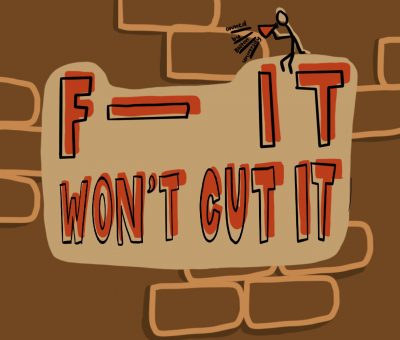Boston University’s “F— It Won’t Cut It” health campaign was created by advertising and public relations students to encourage their peers to practice safe behaviors on campus amid the COVID-19 pandemic.
FIWCI was an exciting, uplifting idea that had potential to unite our community against COVID-19. But it seems to have lost its way, buried under an eagerness for national recognition and bottomless funding from BU.
Eight months after FIWCI’s fruition, we currently find the campaign under investigation by BU Student Government for allegations of verbal harassment and questions concerning how the group is funded.

I’m in no place to confirm or deny the validity of the accusations, but I can’t say they were groundless or unexpected.
The FIWCI campaign has evolved from one that aimed to better the community to something that strives to advance BU’s own image and prestige. And the University perhaps has had a shady role in this transition.
The student-run campaign was approved to be funded by the University after its pitch. By August 2020, BU filed a trademark for the name.
Since then, a seemingly exorbitant and unspecified amount of money has been funneled into the campaign. FIWCI logos are plastered across Warren Towers walls and BU Shuttles. Merchandise is also handed out frequently.
During Halloween, the campaign hosted a Zoom Q&A with stand-up comedian Hasan Minhaj. On the University Wellness Day March 30, the campaign paid for 1,000 free Bluebike passes.
FIWCI is not a “for students, by students” campaign, as it states in its Instagram bio — in truth, BU is most likely its financial benefactor, which makes the campaign’s real intentions all the more confusing.
Many BU Reddit users stated that they believe the school is “astroturfing,” or only appearing as a grassroots movement to further its own agenda.
After all, this arrangement sheds BU of real accountability regarding its students’ safety — while at the same time, it makes BU look really accountable in the public eye.
I do not recall any published evidence proving the FIWCI campaign and its initiatives have had any impact on COVID-19 statistics.
In fact, there have been plenty of complaints that remain unaddressed.

One of FIWCI’s common public service announcements included the advice to wash bed sheets once every two weeks, which is an arbitrary form of advice that experts don’t unanimously agree on. This became especially troubling to students when the University itself offered no help in light of significant laundry costs.
While FIWCI is inarguably one of the most prominent, recognizable student-run campaigns — on campus and in the nation — I’m now uncertain of whether BU took on the initiative for the right reasons or used its well-intentioned students for some performative maneuver.
The history of FIWCI and its lack of transparency begs the question: Was this the best way to use BU’s funds and resources?
Could they instead have gone toward free laundry, which BU’s Young Democratic Socialists have been advocating for, or toward Student Health Services’ Behavioral Medicine, which still does not meet the needs of many of its students? Could some of the budget for this campaign have been trimmed to save even one staffer from being furloughed?
BU doesn’t seem to share the same concerns.
“[FIWCI’s] been extraordinarily successful,” said Colin Riley, BU’s spokesperson, in response to the StuGov investigation. “Anything that suggests otherwise is missing the point.”
In fact, it is Riley who has missed the point.
This is no longer about FIWCI’s commercial success but about a campaign with several serious allegations from its community that so far remain unaddressed. BU administration was supposed to be responsible for FIWCI — so will it take responsibility or continue to use the “student-run” label to its advantage?
























































































































Ian • Apr 13, 2021 at 12:49 pm
I’m getting kinda tired of you all signal boosting these claims without bothering to check on or corroborate anything. Like failing to mention that the senator leading the investigation is no longer in stugov and has completely disappeared from reddit after even a slight pushback on his methodology. Or that his investigation amounted to a google survey shared around the subreddit. Kinda frustrating to watch this, it seems like frustration for frustration’s sake.